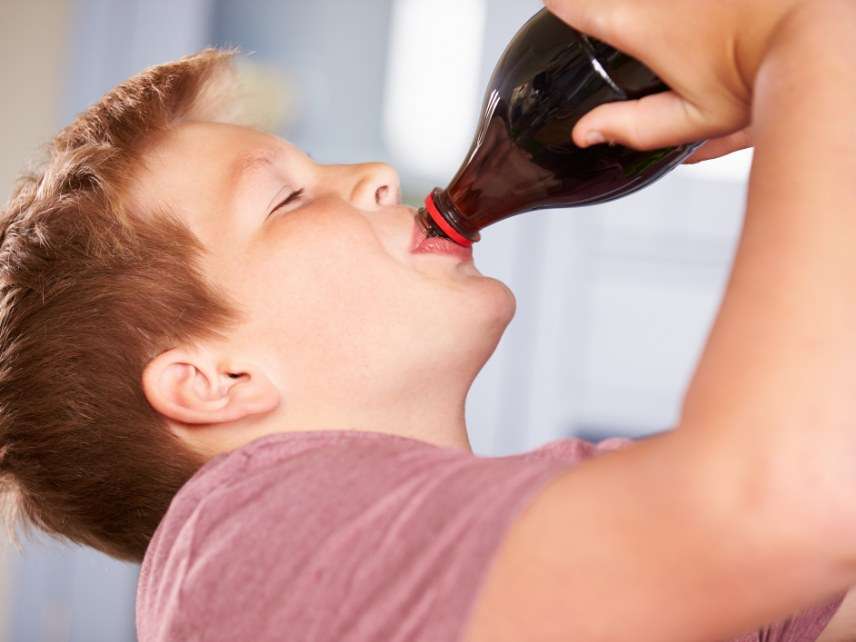Chicago's Soda Tax Fizzles
Everybody realized it was about bringing in money, not improving public health.

Chicago's controversial soda tax is dead. Lawmakers in Cook County, Il., which includes Chicago and more than 100 surrounding cities, towns, and villages, including Evanston (where I went to grad school) and Des Plaines, voted this week to repeal the tax.
It was big news when lawmakers in the second largest county in the United States voted last year to adopt the soda tax. Supporters hailed it as "the biggest deal yet."
But guess what? It's an even bigger deal that the tax has been repealed.
The short-lived tax, passed in November 2016, was a disaster. Billed as a way to raise revenue and improve residents' health, instead it spurred lawsuits and threats from the federal government. Retailers complained beverage sales had plummeted by nearly half, thanks in part to wealthier consumers avoiding the tax by driving outside the county to buy soda.
Chicago learned soda taxes aren't the panacea their supporters claim. I oppose them for many reasons. For example, they're regressive, promote layoffs, don't reduce obesity, and could be the foot in the door that's used to further erode food freedom, I wrote last year in a Sun-Times op-ed.
Chicago's two main newspapers, the Tribune and the Sun-Times, published strongly worded editorials and columns in recent days blasting the tax and celebrating its looming demise.
"Crack open that can of soda with gusto, taxpayers," the Tribune editorial board wrote. "You won." The Tribune's editors used words like "deceit" and "a lie" to describe the tax. They'd used similar language just last month in another scathing editorial blasting the tax.
The county had billed the tax as a health measure. But, as criticism mounted, even supporters on the council were forced to admit the obvious: the tax was nothing but a money grab. Sun-Times columnist Neil Steinberg labeled the tax "a bald cash grab" that "was never about battling obesity or diabetes."
"That penny-per-ounce soda tax had nothing to do with our health," wrote Tribune columnist Dahleen Glanton. "It was only about the money."
Glanton dubbed a flurry of pro-tax ads targeting African American and Latino voters "insulting," "condescending," and "insincere." Those ads were bankrolled by former New York City mayor Michael Bloomberg, a longtime soda foe, in an effort to rescue the tax in the face of what Glanton and others rightly painted as an "angry backlash" from consumers.
If all this sounds kinda familiar, then you've been paying attention. Like Chicago's reviled foie gras ban—passed by the city council in 2006 and repealed by the same council 2008—the county soda tax was voted in and then out largely by many of the same lawmakers who'd passed the law.
In 2016, a decade after its passage, the Tribune dubbed the short-lived foie gras ban a "fiasco." In 2027, I have no doubt, if newspapers still exist in some form, that a post-mortem of the soda tax might use similar language.
Though recent ballot measures have seen some victories for soda taxes, this repeal is further evidence that the tide may be turning. Philadelphia's tax, already facing a legal challenge, has seen collections fall short of lofty revenue projections. A similar repeal move by lawmakers in Philadelphia isn't looming, but it's also not out of the question.
Still, the fact lawmakers and pundits in Cook County came to their senses doesn't mean soda taxes are verboten. Last month, the Des Moines Register editorial board urged the state—home to highly subsidized corn farmers who raise crops that are turned into the high fructose corn syrup that commonly sweetens soda—to adopt a soda tax.
I flew into Chicago's O'Hare airport yesterday, on my way up to a board meeting in Wisconsin. While the tax is still in effect until December, and I don't normally drink soda (maybe a six-pack or so per year, total), I made an exception after I landed in Chicago. It tasted sweet, like victory.


Show Comments (29)